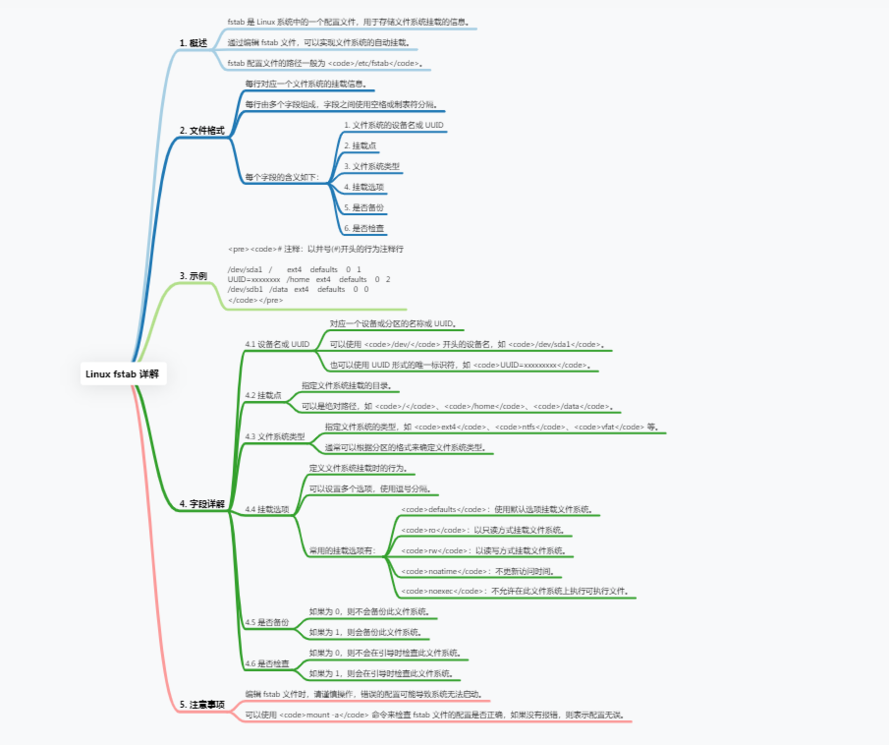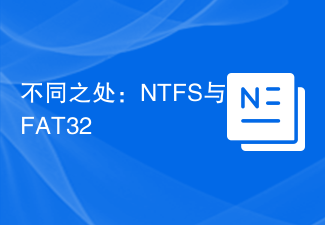
#The file system is the method and data structure used by the operating system to identify files on storage devices (commonly disks, but also solid-state drives based on NAND Flash) or partitions; That is, a method of organizing files on a storage device.
The software organization responsible for managing and storing file information in the operating system is called the file management system, or file system for short.
The file system consists of three parts: the file system interface, a collection of software for object manipulation and management, and objects and attributes. (Recommended learning: web front-end video tutorial)
From a system perspective, the file system organizes and allocates the space of the file storage device, and is responsible for file storage and processing of stored files. Systems for protection and retrieval.
Specifically, it is responsible for creating files for users, storing, reading, modifying, and dumping files, controlling file access, and revoking files when the user no longer uses them.
In a computer, a file system is a system for naming files and placing logical storage and recovery of files.
DOS, Windows, OS/2, Macintosh, and UNIX-based operating systems all have file systems in which files are placed somewhere in a hierarchical (tree-like) structure. . Files are placed into directories (folders in Windows) or subdirectories at the desired location in the tree structure.
The file system specifies the rules for naming files. These rules include the maximum number of characters in a filename, what kinds of characters can be used, and how long a filename suffix can be on some systems.
The file system also includes a format for specifying paths to find files through a directory structure.
The file system is a part of the software system. Its existence allows applications to conveniently use abstract named data objects and variable-sized spaces.
The file system is the method and data structure used by the operating system to identify files on the disk or partition; that is, the method of organizing files on the disk. Also refers to the disk or partition used to store files, or the type of file system.
Therefore, it can be said that "I have 2 file systems" means that he has 2 partitions, one to store files, or he uses "extended file system", which means the type of file system.
The difference between a disk or partition and the file system it contains is important. A few programs (including most legitimately those that generate file systems) operate directly on the raw sectors of a disk or partition; this may corrupt an existing file system. Most programs operate based on file systems and cannot work on different file systems.
Before a partition or disk can be used as a file system, it needs to be initialized and the record data structure written to the disk. This process is called creating a file system.
The above is the detailed content of What is used to manage files in the file system. For more information, please follow other related articles on the PHP Chinese website!
 如何应对Linux系统中的文件系统崩溃问题Jun 29, 2023 pm 04:05 PM
如何应对Linux系统中的文件系统崩溃问题Jun 29, 2023 pm 04:05 PM如何应对Linux系统中的文件系统崩溃问题引言:随着计算机技术的不断发展,操作系统的稳定性和可靠性也变得越来越重要。然而,尽管Linux系统被广泛认为是一个稳定和可靠的操作系统,但仍然存在文件系统崩溃的可能性。文件系统崩溃可能会导致数据丢失和系统异常等严重后果。因此,本文将介绍如何应对Linux系统中的文件系统崩溃问题,以帮助用户更好地保护自己的数据和系统。
 fstab(File System Table)Feb 19, 2024 pm 06:30 PM
fstab(File System Table)Feb 19, 2024 pm 06:30 PMfstab(FileSystemTable)是Linux系统中的一个配置文件,用于定义系统启动时挂载文件系统的规则。fstab文件位于/etc目录下,可通过手动创建或编辑器修改。每行规定一个要挂载的文件系统。每一行有六个字段,它们的意义如下:文件系统设备文件或UUID可用于指定要挂载的文件系统的设备,UUID是一个独特的标识符,可通过blkid命令获取设备的UUID。2.挂载点:指定文件系统要挂载到的目录,可以是绝对路径(例如/mnt/data)或者相对路径(例如../data)。3.文件系统类
 Go语言中如何处理并发文件的文件系统文件锁和进程间文件共享问题?Oct 09, 2023 pm 05:53 PM
Go语言中如何处理并发文件的文件系统文件锁和进程间文件共享问题?Oct 09, 2023 pm 05:53 PMGo语言中处理并发文件的文件系统文件锁和进程间文件共享问题引言:在Go语言中,我们常常需要处理并发访问文件的情况,包括文件系统文件锁和进程间文件共享。本文将介绍如何使用Go语言处理这些问题,并提供具体的代码示例。一、文件系统文件锁在多个并发程序同时访问同一个文件时,为了避免出现竞争条件和数据不一致的问题,我们可以使用文件系统文件锁来进行同步。Go语言提供了s
 不同之处:NTFS与FAT32Feb 18, 2024 pm 10:18 PM
不同之处:NTFS与FAT32Feb 18, 2024 pm 10:18 PMNTFS和FAT32是两种常见的文件系统,用于组织和管理计算机硬盘上的数据。虽然它们都具有一些共同的功能和特点,但在许多方面也有一些重要的区别。本文将探讨NTFS和FAT32之间的几个主要区别。功能和性能:NTFS(NewTechnologyFileSystem)是微软Windows操作系统中较新的文件系统,它具备许多先进的功能,如数据压缩、文件加密、
 深入了解Linux的标准文件系统(Ext2/Ext3/Ext4)Dec 31, 2023 pm 10:18 PM
深入了解Linux的标准文件系统(Ext2/Ext3/Ext4)Dec 31, 2023 pm 10:18 PMExt全称Linuxextendedfilesystem,extfs,即Linux扩展文件系统,Ext2就代表第二代文件扩展系统,Ext3/Ext4以此类推,它们都是Ext2的升级版,只不过增加了日志功能,且彼此向下兼容,所以Ext2被称为索引式文件系统,而Ext3/Ext4被称为日志式文件系统。备注:Linux支持很多文件系统,包括网络文件系统(NFS)、Windows的Fat文件系统。查看Linux支持的文件系统:ls-l/lib/modules/$(uname-r)/kernel/fs查看
 Linux系统命令大全。Feb 19, 2024 pm 10:54 PM
Linux系统命令大全。Feb 19, 2024 pm 10:54 PM以下是常见的Linux系统命令大全(按字母顺序排列):alias:设置命令别名awk:文本处理工具,用于提取和操作文本数据cat:连接文件并打印到标准输出cd:改变当前工作目录chmod:修改文件或目录的权限chown:修改文件或目录的所有者和所属组chroot:改变根文件系统目录cp:复制文件或目录cron:定时任务管理工具curl:用于下载或上传文件的命令行工具cut:按列提取文本数据date:显示或设置系统日期和时间dd:复制和转换文件df:显示文件系统的磁盘使用情况diff:比较文件或目
 Go语言中如何处理并发文件的文件系统文件切割和文件合并问题?Oct 08, 2023 am 11:13 AM
Go语言中如何处理并发文件的文件系统文件切割和文件合并问题?Oct 08, 2023 am 11:13 AMGo语言中如何处理并发文件的文件系统文件切割和文件合并问题?在处理大文件时,我们常常需要将文件切割成小块进行处理,并在处理完成后将小块文件合并成一个完整的文件。在并发处理大文件时,我们希望能够充分利用多个处理器核心来提高处理速度。Go语言提供了丰富的并发处理机制和文件操作函数,可以很方便地实现文件系统文件切割和文件合并。首先,我们需要确定文件切割的大小。可以
 CentOS文件系统常见问题解答Feb 23, 2024 pm 12:45 PM
CentOS文件系统常见问题解答Feb 23, 2024 pm 12:45 PMCentOS文件系统常见问题解答在使用CentOS操作系统过程中,文件系统是一个至关重要的组成部分。它负责存储、组织和管理文件和目录,对系统的稳定运行和数据安全起着至关重要的作用。然而,不可避免地,在使用文件系统的过程中会遇到一些常见问题。本文将针对CentOS文件系统常见问题进行解答,希望能帮助读者更好地理解和处理这些问题。问题一:如何查看文件系统的使用情

Hot AI Tools

Undresser.AI Undress
AI-powered app for creating realistic nude photos

AI Clothes Remover
Online AI tool for removing clothes from photos.

Undress AI Tool
Undress images for free

Clothoff.io
AI clothes remover

AI Hentai Generator
Generate AI Hentai for free.

Hot Article

Hot Tools

SAP NetWeaver Server Adapter for Eclipse
Integrate Eclipse with SAP NetWeaver application server.

Dreamweaver Mac version
Visual web development tools

ZendStudio 13.5.1 Mac
Powerful PHP integrated development environment

Atom editor mac version download
The most popular open source editor

SublimeText3 Linux new version
SublimeText3 Linux latest version






